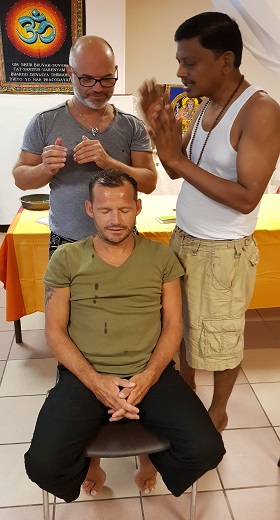Are you ready to take control of your health and wellbeing? Look no further than Ayurveda, the ancient Indian system of medicine that has been proven to enhance physical and mental wellbeing. Ayurveda therapy courses offer a unique opportunity to empower yourself with the knowledge and skills to live a more balanced and fulfilling life. With its holistic approach to wellness, Ayurveda focuses on the interconnectedness of the body, mind, and spirit, offering a comprehensive understanding of health and healing. Through the study of Ayurveda, you will not only learn about the principles and practices of this ancient science but also gain practical tools to implement them into your daily routine. Whether you are a wellness enthusiast, a healthcare professional, or simply someone looking to improve your own well-being, Ayurveda therapy courses can provide you with the knowledge and skills to transform your life. Discover how Ayurveda can empower you to live your best life and achieve optimal health and wellbeing.
Understanding the Principles of Ayurveda Therapy
Ayurveda, which means "knowledge of life," is an ancient holistic healing system that originated in India over 5,000 years ago. It is based on the belief that each person is unique and has a specific constitution, or dosha, which determines their physical, mental, and emotional characteristics. The three doshas, known as Vata, Pitta, and Kapha, are made up of the five elements: ether, air, fire, water, and earth. According to Ayurveda, when these doshas are in balance, we experience good health, but when they are imbalanced, we become susceptible to illness.
Ayurveda therapy focuses on bringing the doshas into balance through various treatments and therapies, such as massage, herbal remedies, and dietary changes. By understanding the principles of Ayurveda therapy, you can gain a deeper understanding of your own body and how to promote optimal health and wellbeing.
Benefits of Ayurveda Therapy
One of the key benefits of Ayurveda therapy is its holistic approach to wellness. Unlike Western medicine, which often treats symptoms in isolation, Ayurveda looks at the whole person and addresses the root cause of the imbalance. This comprehensive approach can lead to long-term health benefits and a greater sense of wellbeing.
Ayurveda therapy is also known for its ability to promote relaxation and reduce stress. Many of the treatments used in Ayurveda, such as oil massages and meditation, have been shown to calm the nervous system and promote a sense of calm and tranquility. In today's fast-paced world, where stress is a major contributor to many health problems, Ayurveda therapy can provide a much-needed respite and help restore balance to the mind and body.
Ayurveda Therapy Courses: What to Expect
If you're interested in learning more about Ayurveda and how to incorporate its principles into your life, enrolling in an Ayurveda therapy course is a great place to start. These courses are designed to provide you with a comprehensive understanding of Ayurveda and its practical applications.
In an Ayurveda therapy course, you can expect to learn about the theory and philosophy of Ayurveda, including the doshas, the five elements, and the concept of balance. You will also study various Ayurvedic treatments and therapies, such as Panchakarma detoxification, herbal medicine, and dietary guidelines. Additionally, you will gain practical skills, such as how to perform Ayurvedic massages and how to create personalized wellness plans for yourself and others.
Types of Ayurveda Therapy Courses Available
Ayurveda therapy courses come in various formats and durations, ranging from short workshops to in-depth training programs. Some courses are focused on specific areas of Ayurveda, such as Ayurvedic nutrition or Ayurvedic yoga, while others provide a more holistic overview of the entire system.
When choosing an Ayurveda therapy course, it's important to consider your goals and interests. If you are looking to deepen your understanding of Ayurvedic principles for personal use, a shorter workshop or online course may be sufficient. However, if you are considering a career in Ayurveda, you may want to invest in a more comprehensive training program that covers a wide range of topics and provides hands-on experience.
Choosing the Right Ayurveda Therapy Course for You
With the growing popularity of Ayurveda, there are now many options available when it comes to choosing an Ayurveda therapy course. To ensure you find the right fit for your needs, it's important to do your research and consider the following factors:
1. Accreditation: Look for courses that are accredited by reputable Ayurveda organizations or institutions. This ensures that the course meets certain standards and provides quality education.
2. Curriculum: Review the course curriculum to ensure it covers the topics and areas of Ayurveda that you are most interested in. Some courses may focus more on theory, while others may offer a more practical approach.
3. Teachers: Consider the qualifications and experience of the teachers who will be leading the course. Look for instructors who have extensive knowledge and hands-on experience in Ayurveda.
4. Reviews and testimonials: Read reviews and testimonials from past students to get an idea of their experience and the quality of the course. This can give you valuable insights into what to expect.
By carefully considering these factors, you can choose an Ayurveda therapy course that aligns with your goals and provides you with the knowledge and skills you need to enhance your wellbeing.
Enhancing Your Wellbeing Through Ayurveda Therapy
Once you have completed an Ayurveda therapy course, you will have a wealth of knowledge and practical tools to implement into your daily routine. Ayurveda emphasizes the importance of self-care and self-awareness, and through the practice of Ayurvedic principles, you can enhance your overall wellbeing.
One of the key ways to enhance your wellbeing through Ayurveda therapy is by adopting an Ayurvedic lifestyle. This includes following a balanced diet that is suited to your dosha, practicing regular exercise and yoga, and incorporating mindfulness and meditation into your daily routine. By aligning your lifestyle with the principles of Ayurveda, you can promote optimal health and wellbeing.
Integrating Ayurveda Therapy into Your Daily Routine
Integrating Ayurveda therapy into your daily routine doesn't have to be overwhelming. Start by making small changes that align with your dosha and personal preferences. For example, if you are predominantly Vata, you may benefit from incorporating warm and grounding foods into your diet, such as cooked vegetables and nourishing soups. If you are predominantly Pitta, focus on cooling and calming practices, such as meditation and spending time in nature. And if you are predominantly Kapha, incorporate more invigorating and energizing activities, such as vigorous exercise and dry brushing.
Another important aspect of integrating Ayurveda therapy into your daily routine is self-care. Ayurveda emphasizes the importance of taking care of yourself on all levels - physically, mentally, and emotionally. This can include practices such as oil massage, herbal baths, and daily rituals that help to nourish and rejuvenate your body and mind.
Ayurveda Therapy for Specific Health Conditions
In addition to promoting overall wellbeing, Ayurveda therapy can also be used to address specific health conditions. Ayurvedic practitioners are trained to assess a person's dosha imbalance and develop personalized treatment plans to address their unique needs.
For example, if you are experiencing digestive issues, an Ayurvedic practitioner may recommend dietary changes, herbal remedies, and lifestyle modifications that can help restore balance to your digestive system. If you are struggling with stress or anxiety, Ayurveda offers various relaxation techniques and herbal remedies that can calm the nervous system and promote mental wellbeing.
It's important to note that Ayurveda therapy should always be practiced under the guidance of a qualified Ayurvedic practitioner, especially when addressing specific health conditions. They can provide you with personalized recommendations and monitor your progress to ensure you are getting the best results.
Conclusion: Empowering Yourself with Ayurveda
Ayurveda therapy courses provide a unique opportunity to empower yourself with the knowledge and skills to enhance your overall wellbeing. By understanding the principles of Ayurveda and incorporating them into your daily routine, you can achieve optimal health and balance in all aspects of your life.
Whether you are a wellness enthusiast, a healthcare professional, or simply someone looking to improve their own wellbeing, Ayurveda therapy courses can provide you with the tools you need to transform your life. From learning about the doshas and the principles of Ayurveda to gaining practical skills in Ayurvedic treatments and therapies, these courses offer a comprehensive understanding of this ancient science.
Take the first step towards empowering yourself with Ayurveda and embark on a journey of self-discovery and healing. Embrace the wisdom of Ayurveda and unlock your full potential for health and wellbeing.






.jpg)


